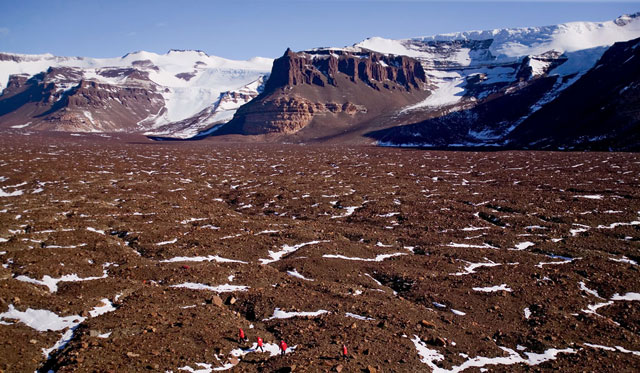 |
| This often used bit of artwork is used to illustrate Ancient Mars as often as it is a terraformed Mars. |
So why Mars? And what are the odds we'll succeed?
The answer turns out to be more complicated than you'd think, and based less on the search for life and more on the limits of our spacecraft: Mars is certainly not an ideal place to be seeking out alien life. The surface is a (much!) more hostile version of Antarctica; To get a Mars like environment on Earth, take Antarctica and put it on top of a mountain 30 km high - not friendly.
 |
| Above: Antarctica - like Mars but with more air. Yes folks, the place NASA gets so excited about is even grimmer than this. |
 |
| Above: The ice covered ocean world Europa - considered by many to be our best hope for finding alien life. |
That doesn't mean we're looking to Mars in vain: Mars may be a desert today, but in the deep past volcanic heat kept things warmer, clean surface water was liquid at least some of the time, and there was (and possibly is) some sort of carbon chemistry going on - the three things that are generally recognised as vital for life are liquid (probably water... lets say water for the sake of simplicity today) carbon chemistry and an energy source.
So Mars once had ideal conditions for life, and lost them: In some ways that's actually more interesting than a habitable modern Mars. We can use Mars as a place to hunt for signs of life in the ancient past, and we can use it to learn how a habitable planet becomes an uninhabitable (or at most only borderline habitable) one. What's more we know that over long periods of time the Martian climate naturally shifts between more and less habitable modes, so we'd like to fully understand that too - not a bad idea given our own current problems with climate change.
More than that, the Martian climate changed relatively slowly, so if there was any life there to begin with, and IF it has some how evolved to survive on modern Mars, we could chart he extreme outer edge of what evolution can do.
So, no, all else being equal Mars is not the ideal place to go to look for life. But all else is not equal..... and there are enough great reasons to make the trip worthwhile.
No comments:
Post a Comment